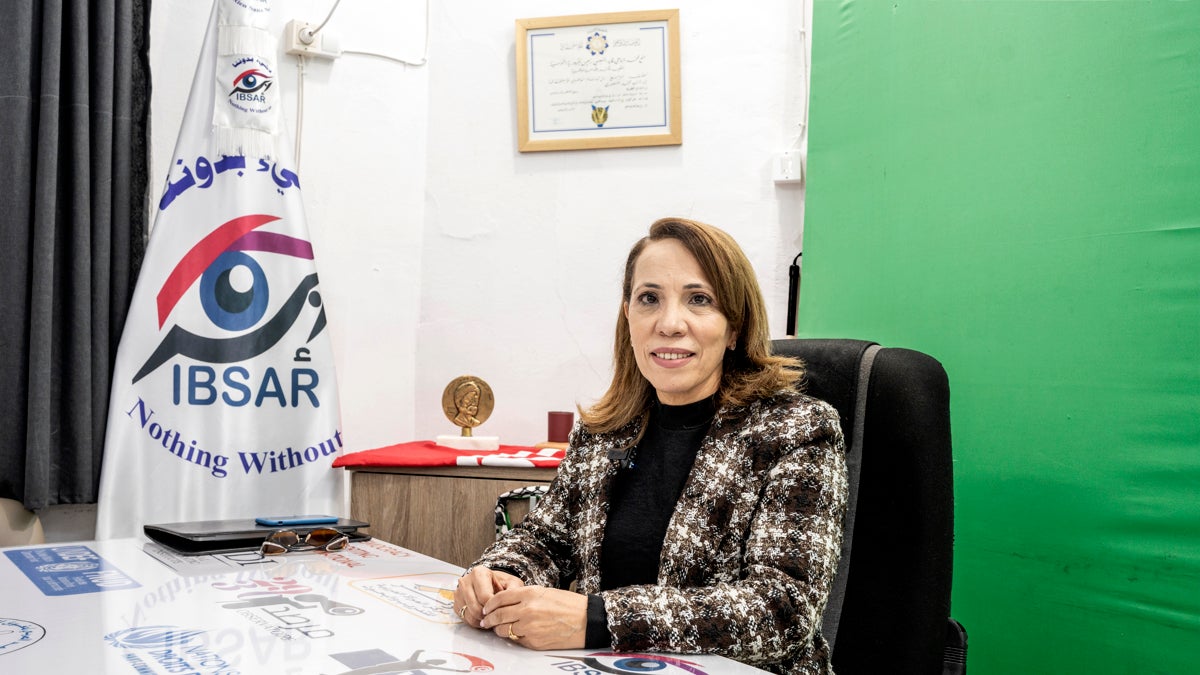“I Now Have the Tools”
Human Interest Story (Tunisia) -- Besma Essoussi
Date:

Besma Essoussi became visually impaired when she was 35 years old. She discovered she had a hereditary illness that will eventually cause her to go entirely blind.
“The moment the world became invisible to me, I became invisible to society,” said Besma.
Now, at 58, she is an active and vibrant leader in her home country of Tunisia, passionate about advocating for the rights of women, especially those with disabilities.
“We are left behind,” Besma explained. “There is very little access to information for people with disabilities.”
As the host of her own radio show, an accomplished journalist and a self-described activist, Besma has proven the strength of her leadership for women with disabilities. She is vice-president of IBSAR, an organisation that advocates for the blind and visually-impaired, and is fluent in French, Arabic and English.
Through participation in UN Women’s initiative on combatting online violence against women, Besma has woven her passion for amplifying the voices of women with disabilities together with what she has learned about the severity of online violence against women (OVAW). “Defamation and stigmatisation are among the most common forms of online violence for women and girls active in the digital space, which multiply when there is a difference, as is the case for women with disabilities,” Besma said.
OVAW has proliferated especially following the COVID-19 pandemic when more women moved online for work and to reconnect socially. In Tunisia, 54 per cent of women internet users report feeling unsafe online.[1] In the Arab States, 60 per cent of women internet users report having been exposed to some form of online violence in the past year. Of the Tunisian women who have been exposed to online violence, 53 per cent report having been exposed to it during the COVID-19 pandemic. Women with disabilities, especially those with cognitive or intellectual disabilities, are particularly susceptible to online violence.
Besma was one of 16 female activists who participated in a five-day training of trainers (ToT) on online violence hosted by UN Women in 2022 in Tunis, which was part of the programme “Tunisian and Libyan Women and Youth at the Forefront of Preventing Online Violence Against Women and Girls,” supported by the Government of Finland. Soon thereafter the ToT programme, more than 290 women and girls had participated in 14 trainings by those original female activists. They are now better-equipped with information and tools to combat online violence, and to assert their rights to participate in a virtual space as they would in a public space. Besma, herself, can now lead trainings around the country, with a special focus on an intersectional approach to empower women with disabilities to recognize, address and report online violence.
"My participation in the [UN Women] training allowed me to network with a number of organisations and learn about their experiences in combating online violence. As a civil society activist, I will transfer these skills to people with disabilities," explains Besma, whose network ranges across all of Tunisia.
“The opportunities UN Women has opened for me to participate means that now I am in higher demand in the media to comment on women’s rights. I now have the tools to access more information and also to help share that knowledge with other women, especially women with disabilities.”
________________
[1] All statistics in this paragraph are drawn from UN Women’s regional report on OVAW, which can be accessed here.